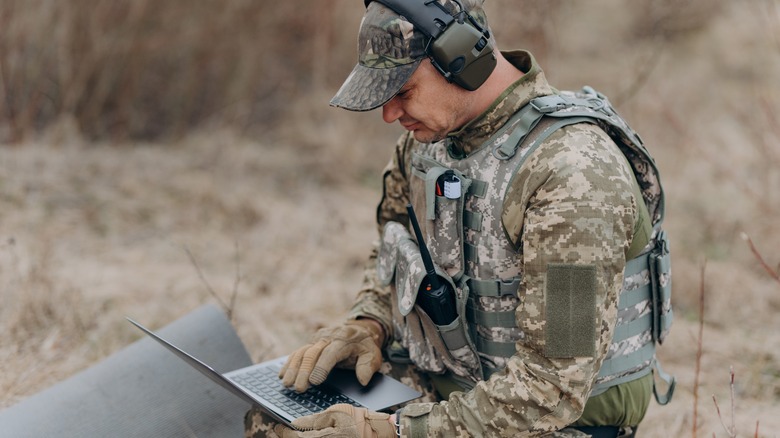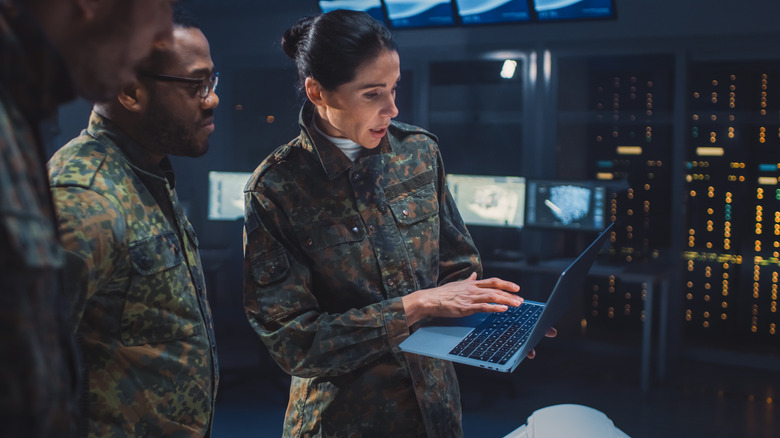What Are Military Grade Laptops And Should You Buy One?
We may receive a commission on purchases made from links.
These days, it can be difficult for laptop manufacturers to distinguish themselves. As consumers, we're often thrown fancy words that we don't always understand, such as IP water ratings for smartphones or display technology names, like UHD or OLED. One term that gets thrown around a lot when it comes to marketing supposedly durable pieces of technology is "military grade."
For laptops designed to accompany soldiers on missions, there is a very good reason why they would need extensive testing against all the things that could go wrong, whether it is exposure to the elements, extreme vibration from vehicles, or even just unexpected drops. After all, in this age of modern warfare, technology can make or break their ability to survive in demanding scenarios.
On the other hand, despite how much consumer technology has evolved throughout the years, a lot of our everyday tech is still considered relatively fragile. For example, Microsoft's Surface Laptop 3 has been known to crack (for no real reason). Not to mention, most people would still get a mini-heart attack if they accidentally spilled water on their laptops. Knowing this, it's unsurprising that people are looking to invest in devices that they hope will last.
For the ordinary person, "military grade" may just sound like a fancy way to say that something is durable (and this isn't entirely wrong). But, what does the term actually mean, who qualifies for it, and should you be looking for it when you're buying your next laptop?
What does military grade protection mean?
From smartwatches, and mobile phones, to laptops, manufacturers of every kind have been referring to their devices as having military-grade protection. However, before companies can say their devices are "military grade" they need to fulfill certain requirements.
Since 1962, the United States Department of Defense (DoD) has released several versions of the MIL-STD-810 or the Environmental Engineering Considerations and Laboratory Test Methods, which is meant as a benchmark for a piece of military equipment's survivability throughout its service life.
In 2019, the DoD published the most recent version of the document with updated guidelines, the MIL-STD-810H. The document itself is split into two parts: environmental engineering program guidelines and laboratory testing methods, which serve to standardize the testing process, including for commercial applications. The MIL-STD-810H is composed of 29 tests, which include the following:
- Low pressure or altitude
- High temperature
- Low temperature
- Temperature shock
- Fluid contamination
- Solar Radiation or sunshine
- Rain
- Humidity
- Fungus
- Salt fog
- Sand and dust
- Explosive atmosphere
- Immersion
- Acceleration
- Vibration
- Acoustic noise
- Shock
- Pyroshock
- Acidic atmosphere
- Gunfire shock
- Temperature, humidity, vibration, and altitude
- Icing or freezing rain
- Ballistic shock
- Vibro-acoustic or temperature
- Freeze or thaw
- Time waveform replication
- Rail impact
- Multi-exciter
- Mechanical vibrations of shipboard equipment
To create these guidelines, the DoD mentioned contributions from the United States Army, Air Force, and Navy, as well as individuals from private industry and related organizations, like the Shock and Vibration Exchange (SAVE) and the Institute of Environmental Sciences and Technology (IEST).
How does military-grade testing work for consumer items?
As of writing, there is also no single governing body that certifies commercial technology as military-grade. Despite this, there are accredited testing centers that can fulfill MIL-STD-810 tests for manufacturers. However, many of these facilities only cover a selected number of tests, which are relevant for consumer applications. For example, Finland-based TopTester, which provides MIL-STD-810 testing, shares on its website that it doesn't offer testing for things like acceleration, pyroshock, and ballistic shock.
From a commercial standpoint, it's important to note that devices will not be tested for everything and will likely only be tested on concerns they are expected to encounter for everyday use. To list devices as "military grade," manufacturers don't even have to fulfill the same number or even do the same type of tests.
Among laptop manufacturers, ASUS claims to have the "world's most strictly tested U.S. military-grade laptop durability." For its selected products, ASUS mentions that it conducted 12 test methods and 26 procedures based on the most recent MIL-STD-810H standards. On the other hand, Lenovo shares that its military-grade product line is currently being tested for 12 methods and 20 procedures using the MIL-STD 810G, the previous iteration of the MIL-STD-810H.
Similarly, MSI's military-grade laptops list only ten trials that fulfill the MIL-STD 810G standards, which include extreme temperatures, humidity, sand & dust, shock, and so on. Dell's Latitude Rugged Extreme testing reveals that some Latitude laptops also passed several tests using the MIL-STD-810G standard.
What laptops have MIL-STD-810 compliance?
It's important to note that aside from MIL-STD-810H, there are other military certifications like the MIL-S-901, MIL-STD-167, and MIL-STD-461G, which focus on other areas such as electromagnetic (EM) compatibility and secure communications. However, many companies refer to the MIL-STD-810H partly due to its broad coverage that includes a variety of possible environmental situations.
Through the years, many laptop manufacturers have released product lines that bash against handpicked tests from the MIL-STD-810 standard. While you can easily spot some sturdy beasts with their macho names like Panasonic's Toughbook, some ordinary-looking devices still check a lot of boxes.
According to MSI, it considers several models from its Summit, Prestige, Modern, Creator, and Creator Pro Series, as military-grade. On the other hand, Lenovo's ThinkPad products have hit the mark since 2007. While the Apple Watch Ultra has proved its durability with MIL-STD-810H certifications in relevant conditions, it didn't disclose if its Mac devices have undergone similar testing. Although Dell has mentioned that its AI-powered Latitude family also passed the MIL-STD-810H standards, the exact tests were not disclosed, unlike its Rugged laptops with published MIL-STD-810G certifications from independent testing sites in the US, China, and Taiwan.
Similar to other forms of testing, it's important to take into consideration that even if your laptop model is certified, it doesn't necessarily mean it will maintain the same level of durability forever. After all, testing typically occurs in controlled environments, such as labs, and reality can be much messier.
Do you need a Military Grade laptop?
As with many things in life, whether or not you actually need a military-grade laptop highly depends on your particular lifestyle. For example, if you tend to live a particularly rugged life for work, like climbing mountains, going into forests, or crossing rivers, it might be worth it. And if you're hoping to cover all your bases, we've also prepared the highest-rated rugged smartphones in the market that you might to add to your tech arsenal.
While you don't necessarily need to be in the military to enjoy the benefits of a sturdy laptop, it doesn't hurt to have a device with these specifications, if the budget allows. That being said, it's important to note that even if many manufacturers claim their laptops are military grade, they won't necessarily cover damages under these conditions. In fact, several manufacturers who claim their product lines can withstand several MIL-STD-810 tests have stated that any damages from similar exposure would not be included in their standard warranty.
If anything, a laptop built with military specifications can give you some peace of mind, but it won't guarantee protection for your wallet. However, if you're keen on giving your laptop without any military-grade certifications a fighting chance in the wild, there are plenty of drop-tested cases and bags that can help make a difference.




